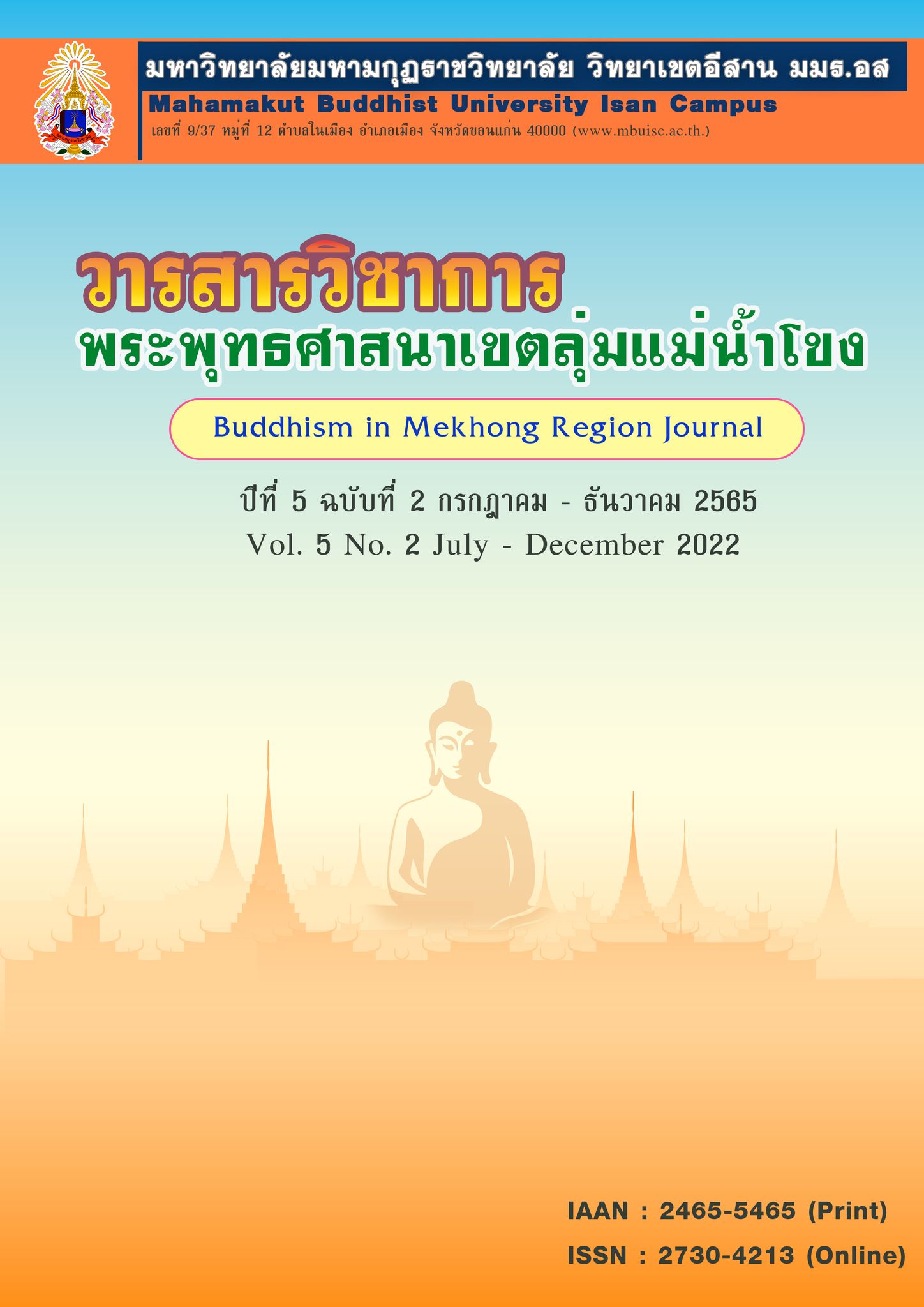The basic virtues of human beings
Main Article Content
Abstract
Morality as the basis of humanitarianism It is a practice in daily life to be a complete human being "humanitarian" (dharma that makes people human) because those who are virtuous will be a quality person who can raise life to another level from ordinary people who are still Most of his life was influenced by his instincts. As for those who are virtuous, they will step into being a human being who is ready to become a partner of a civilized society who can lead both their own lives, others ' and the society as a whole to a broad and supportive peace. non-interference with each other Virtue is the foundation of goodness which is the basis of human beings. It is a guideline for behavior and expression as the location of the intention. to produce good results for others by being a good person with virtue Honesty, think good, speak good, do good, think straight, speak straight, act directly both in front of and behind your back. Do not waver in words and deeds. including having mercy to help those who are in need Most importantly, they must not oppress others, do not cheat, do not abuse weaker people or women, do not corruption. and do not do dishonesty" "morality is humanity" that all human beings must lead Intelligence comes to control behaviors, both physically, verbally and mentally, to be within the framework. This will bring peace and tranquility in society both now and in the future.
Article Details

This work is licensed under a Creative Commons Attribution-NonCommercial-NoDerivatives 4.0 International License.
- ผลงานที่ส่งตีพิมพ์จะต้องไม่เคยเผยแพร่ในสิ่งตีพิมพ์อื่นใดมาก่อนและต้องไม่อยู่ในระหว่างการพิจารณาของวารสารอื่น การละเมิดลิขสิทธิ์ถือเป็นความรับผิดชอบของผู้ส่งบทความโดยตรง
- ต้นฉบับที่ส่งตีพิมพ์ต้องเป็นภาษาไทยหรือภาษาอังกฤษเท่านั้น
- ต้นฉบับต้องผ่านการกลั่นกรองโดยผู้ทรงคุณวุฒิและได้รับความเห็นชอบจากกองบรรณาธิการ
- ในกรณีที่เป็นบทความแปล ต้องได้รับอนุญาตจากเจ้าของลิขสิทธิ์ โดยการขออนุญาตให้เป็นไปตามหลักจริยธรรมสากล
- ข้อความ เนื้อหา รูปภาพ และตาราง ที่ตีพิมพ์ในวารสาร เป็นความรับผิดชอบของผู้เขียนบทความแต่เพียงผู้เดียว มิใช่ความคิดเห็นและความรับผิดชอบของกองบรรณาธิการวารสาร กองจัดการ และมหาวิทยาลัยมหามกุฏราชวิทยาลัย วิทยาเขตอีสาน
6. ผลงานที่ได้รับการตีพิมพ์ถือเป็นลิขสิทธิ์ของวารสาร
References
การศาสนา, กรม.(2541). คู่มือการพัฒนาคุณธรรม จริยธรรมสำหรับผู้บริหาร. กรุงเทพมหานคร : โรงพิมพ์กรมการศาสนา.
พระไตรปิฎกฉบับมหามกุฏราชวิทยาลัย. พระสุตตันตปิฎก ทีฆนิกาย สีลขันธวรรค เล่ม 1 ภาค 1
พระธรรมปิฎก (ประยุทธ์ ปยุตฺโต). “พจนานุกรมพุทธศาสน์ ฉบับประมวลศัพท์”.
พระธรรมปิฎก (ป.อ. ปยุตฺโต). (2540). พระพุทธศาสนากับการพัฒนาคนและสังคม. กรุงเทพฯ : การไฟฟ้าฝ่ายผลิตแห่งประเทศไทย.
พระธรรมปิฎก (ป.อ.ปยุตฺโต). (2548). เศรษฐศาสตร์แนวพุทธ. พิมพ์ครั้งที่ 9. กรุงเทพ: สุขภาพใจ.
พจนานุกรมฉบับราชบัณฑิตยสถาน พ.ศ. 2542 (ราชบัณฑิตยสถาน, 2546)
พระพรหมคุณาภรณ์ (ป.อ. ปยุตฺโต). พจนานุกรมพุทธศาสตร์ ฉบับประมวลธรรม.
พิมพ์ครั้งที่ 12 พ.ศ. 2546.
___________ . (2555). พุทธธรรม ฉบับปรับขยาย. พิมพ์ครั้งที่ 32 กรุงเทพมหานคร:
เพ็ทแอนด์โฮม จำกัด.
พิมพ์พรรณ เทพสุเมธานนท์ และนุชนารถ สุนทรพันธุ์. (2537). การศึกษาเพื่อพัฒนา ชีวิตและสังคม (พิมพ์ครั้งที่ 2). กรุงเทพฯ : สำนักพิมพ์มหาวิทยาลัยรามคำแหง.
ประวัติ พื้นผาสุก. (2549). คุณธรรมสำหรับผู้บริหาร. เชียงใหม่ : มหาวิทยาลัยราชภัฏ เชียงใหม่.
วศิน อินทรสระ. (2541). พุทธจริยศาสตร์. กรุงเทพฯ : ทองกวาว.
___________ . (2541). แนวทางการพัฒนาจริยธรรมไทย. กรุงเทพมหานคร: ไทย พัฒนาพานิช.
สุชีพ ปุญญานุภาพ. (2550). พระไตรปิฎกฉบับประชาชน. กรุงเทพฯ . กรมการศาสนา
กระทรวงวัฒนธรรม.


